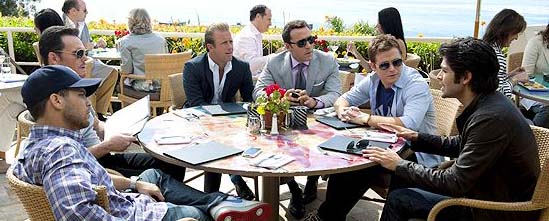Success Advice
18 Lessons We Can All Learn From The TV Show “Entourage”
Entourage, an HBO TV series that ran from 2004-2011, is an American show that focuses on the up-and-coming life of a movie star in Hollywood. Entourage gained popularity for featuring a new celebrity in each episode and for providing a detailed insight on the day-to-day lives of actors, their managers, and agents.
Among the main characters in the show are Ari, Vince, Turtle, Drama, and E. In each series, the characters face new challenges, are granted new opportunities, and have their friendships tested. Based on the characters decisions and actions, viewers are able to take away many business lessons that they can apply to their daily lives while on the journey of reaching success.
After watching every episode numerous times, I have gained the following 18 business lessons that I feel we can all apply at some point in our lives.
1. The company you keep will make or break you in the end
Indirectly; this is what the show is all about. It’s called “Entourage” and is centered around one star and his closest group of friends. Although some work harder than others, they all have the same goal and never let Vince (the star) get off track. They split daily responsibilities, and ensure Vince’s confidence and image remains high.
In season 3, childhood friend Dom was released from prison in New York and immediately tracked down the boys in an attempt to join their Entourage. Although he tried his hardest to fit in, ultimately, he didn’t have the same goals and affected Vince’s career with negative light. It didn’t take long until they split.
2. Think big
Although Turtle didn’t show his entrepreneurial side until later in the show, he always thought big. Whether it was a party, or a new house for the boys – Turtle always looked at the big picture. This later translated into his business mindset. When he had a venture, he didn’t want to be a local company, he wanted to be worldwide. In countless scenes he would call celebrities for financial help and aid in getting the product in markets he had no connections to. He even used Vince’s likeness to negotiate his way into deals.
We all start somewhere with one goal in mind: grow! Never put limitations on your success, if you can dream it, you can achieve it.
3. Hire the right people
Vince was ‘rolling in the cash’ and had enough money to hire a variety of professionals. However, he hired the best of the best because he didn’t waste his money on employees he didn’t need. His 4 basics were an agent, an accountant, a publicist, and a manager. He had his friend Turtle do the driving, and Drama do the cooking.
The lesson here is to spend your money to control costs. All successful people watch their expenditures down to each dollar.
4. Don’t let materialistic pleasures get to your head
Early in the series, Vinny really wanted to pursue a movie against his agent’s recommendations. Ari was pushing a movie that was backed by a studio and a heavy pay cheque. Vince had enough and headed for the door; just before exiting he said
“I came from nothing, and as much as I love all the toys, I really don’t need them.”
The statement really portrays the difference between materialistic people and goal oriented. Vince knew what he wanted and he wasn’t going to get sidetracked by some extra cash.
5. Get back up after defeat
The success of Aquaman took Vince straight to the top of Hollywood. Feeling good, he pursued ‘Medellin’ which bombed at the film festival and didn’t even make it to theatres. His career hit an ultimate low. No directors wanted to work with him and no studios were interested in hiring him. The rejection was new for Vince, but he fought back. He battled his way onto his feet by taking second lead roles, something no star actors like to do due to their egos. Small sacrifices not only got him back on his feet, but had him standing tall once again ready to reach new heights.
In business, you will fall. In fact, you may fall several times. But it’s how you respond to the fall that will define you. If you can look adversity in the eye and get back up, you and your business will strive through any problems you encounter along the journey to success.
6. Remember your roots
Successful people typically hide, or never speak about where they came from. They’re too caught up with their current image that they think their past will define them.
Vince operates oppositely. He knows exactly where he came from, and he’s proud of it. He went from having little to having a lot, but still remains humble. Success is defined by how far you get from your starting point.
When you reach the top, appreciate your success by looking at the distance you traveled to get there. It will boost your confidence and give you a reason to reward yourself.

7. Dress well
If anyone dressed well on the show, it was Ari. Although it may be uncomfortable at times, it really does make a difference. Think about it, would you want to go into business with someone who thinks sharp but dresses like a teenager? When you look good, you feel good. People take you more seriously and it boosts your confidence.
Someone who adopted this change was Turtle. Early on he would wear clothes 3 sizes too big and due to that no one would really look at him, or take him seriously. However, when he later started to get his life together, he lost all his excess weight and began to dress presentable. By the very last episode, he too reached success.
8. Remind your family you love them
Ari, the super agent, is always on the go. From early on in the series it’s clear his wife doesn’t appreciate it. By the end of the 8 series, she’s had enough and is prepared to leave him – but it’s what Ari did throughout the series that sticks out. Literally every scene of Ari and his family included Ari telling one, or all of them, how much he loves them. It’s clear he didn’t get to spend as much time with them as he would like, but he always expressed his love.
Often when we’re working around the clock to build our dream, we neglect our loved ones. We get so caught up in reaching success, we fail with our relationships.
It’s important to put sweat, blood, and tears into your goals, but take time out for your loved ones. They’ll be happier with you and aid you with motivation.
9. Don’t stop the hustle – diversify
When Vince’s career picked up, he stepped outside of acting to diversify the Vincent Chase brand. He sang at birthday parties, became the face for an international energy drink, and even tried his luck in fashion. Most of these moves were for the money, but that’s what business is all about. Why make money from one industry, when you can create multiple incomes? At the end of the day, if one fails, you will always have the other(s).
This is common among both celebrities and athletes. They’re able to use their star power to sponsor companies and products, which usually leads into other neat ventures.
Always offer the public different products – give them choice and selection. When you only cater to one target market, there’s only so far you can get.
10. Fight until the end
Johnny Drama’s acting career was barely existent. Throughout all of the series, he received little to no interest from any directors, and even had a hard time finding an agent. However, there’s no doubt that Drama gave it 100% for each audition and fought for his life in every season. Ultimately, he got his own show and received other multiple deals.
In reality, most of us will have a career like Drama’s before we reach ‘Vince status’. We will have to fight until the end, even if it means getting knocked down over and over.
Determination is key; with it, there’s nothing that can knock you down and keep you down. If you want it bad enough, you will succeed.
11. Go with your instinct
It’s hard not to question your past judgments or actions, especially during adversity. A lot of characters in the show hung their heads after some sort of misfortune, but not Eric. E always went with his gut feeling. Now this isn’t to say your gut feeling is always right, but it’s important not to ignore it despite what others advise you to do. If it’s wrong (which it will be, here and there) don’t hang your head.
What separates leaders from followers is the ability to make decisions and move forward on them.
12. Have confidence in yourself
Although it didn’t always seem like it, Vincent Chase was always a confident character. He was confident in what he wore and everything he did. He would hear comments from time to time pressuring him to change the way he did things, but he believed in himself and stayed confident no matter what stage of life he was in.
In business, if you’re not willing to fight for yourself, don’t think anyone else will. Confidence is everything when you’re leading a team, or presenting your ideas. Believe in yourself, your dreams, and only then others will.

13. It’s never too late
If you think it’s too late to get your life or business together – you’re wrong. Turtle and Drama are prime examples. For Drama, friends or acquaintances often told him to give up on his career due to his age – it would bother him, but he never stopped moving forward. Turtle on the other hand didn’t care about a career until he was at least 30. He found that everyone, including his girlfriend, would treat him like a baby. A lot of this was due to him getting things for free and not working for them. He could have continued to live like a prince, but he wanted respect and he set out to earn it. In the midst of a new venture later in the show, he declined Vince’s offer to take care of him even though he really needed financial help.
He didn’t care how long it took him to do what he needed; he was just focused on reaching his goals and adding accomplishments to his name. At the end of the day, there’s nothing that feels more rewarding.
14. Don’t hang out with the wrong crowd
At one point, Vince got caught up with the wrong crowd. He began dating a porn star and hanging out with Scott, someone who cared more about having fun than anything else. This led to Vince’s drug addiction, which eventually led to Eminem knocking him out and sending him straight into rehab.
It’s nice to go out and have a wild night with your party friends once every blue moon, but the second you go from seeing them a couple times a year to a couple times a day, you’re going to be in trouble.
Going back to lesson 1, you should surround yourself those that will push you to succeed. It might be slow, but they will eventually sink your ship.
15. RUN don’t walk
Time is money. In every season of the show, Ari was on the run. He understood what seconds and minutes added up to and if you weren’t using his time effectively, he would ask you to leave, or simply hang up on you. In other scenes, you’ve probably noticed he literally ran to get to where he needed to be. Ari made sure his days were as productive as possible and never left an opportunity hanging.
A lot of people assume that since they addressed 5/10 things in the day, everything would be fine. Truth is, successful people don’t eat or go home until they hit 10/10. If you don’t seize your opportunities, somebody else will. Vince was once quoted advising E:
“why hold off on something until tomorrow that you can accomplish today?”
16. Suck it up
Lloyd was continuously abused and overworked by Ari, but as he once said “I know it will be worth it in the end.” Lloyd knew it would be a lot of work for him to become a full-time agent, but never once did he back down from his responsibilities. He was verbally abused day in and day out but he remained professional and his work was second to none. During one episode when he took a leave from work for personal issues, Ari literally couldn’t function. Someone as hardworking as Lloyd can never be replaced, so they never are.
17. Reward your supporters
Every time Vince succeeded, he would share the wealth with his entourage, equally. By doing so, all of them felt apart of the success and were happier for Vince. When E got a big paycheck, he took the boys out shopping and let them buy anything they wanted. Now some may argue this is “buying support” but it’s not. All of the guys supported each other from small things like an audition, to landing big movie roles and killing it at the box office. They did it because they wanted each other to succeed; the materialistic things were just a bonus, a sweet bonus.
Choose your relationships wisely.
18. Have fun!
Outside all of the business meetings and negotiations, everyone was having fun. This had a lot to do with them following their passion. None of them were forcing themselves into industries or jobs that didn’t appeal to them, and due to that they had fun even when they were working.
Whether it’s lunch by the pool, or merging with a $100 million dollar company, smile and be happy knowing you’re doing what you love.

Feature Image By HBO
Additional Images Originally Appeared on FilmAffinity
Business
Why Smart Entrepreneurs Are Quietly Buying Gold and Silver
When stocks, property, and cash move together, smart business owners turn to one asset that plays by different rules.

You’ve built your business from the ground up. You know what it takes to create value, manage risk, and grow wealth. But here’s something that might surprise you: some of the most successful entrepreneurs are quietly adding physical gold and silver to their portfolios. (more…)
Business
The Simple Security Stack Every Online Business Needs
Most small businesses are exposed online without realising it. This simple protection stack keeps costs low and risks lower.

Running a business online brings speed and reach, but it also brings risk. Data moves fast. Payments travel across borders. Teams log in from homes, cafés, and airports. (more…)
Business
If Your Business Internet Keeps Letting You Down, Read This
From smoother operations to better security, dedicated internet access is quietly powering today’s high-performing businesses.

Today, a dependable internet service is the bedrock for uninterrupted business operations. Many organizations rely on stable online connections for communication, data transfer, and customer interaction. (more…)
Did You Know
How Skilled Migrants Are Building Successful Careers After Moving Countries
Behind every successful skilled migrant career is a mix of resilience, strategy, and navigating systems built for locals.

Moving to a new country for work is exciting, but it can also be unnerving. Skilled migrants leave behind familiar systems, networks, and support to pursue better job opportunities and a better future for their families. (more…)
-

 News3 weeks ago
News3 weeks agoBrandon Willington Builds 7-Figure Business by Ignoring Almost Everything
-

 Health & Fitness3 weeks ago
Health & Fitness3 weeks agoWhat Minimalism Actually Means for Your Wellness Choices
-

 Did You Know3 weeks ago
Did You Know3 weeks agoWhy Most Online Courses Fail and How to Fix Them
-

 Business3 weeks ago
Business3 weeks agoIf Your Business Internet Keeps Letting You Down, Read This
-

 Business2 weeks ago
Business2 weeks agoEntrepreneur’s Guide to Pay Stubs: Why Freelancers and Small Business Owners Need a Smart Generator
-

 Business1 week ago
Business1 week agoThe Salary Shift Giving UK Employers An Unexpected Edge
-

 Business2 weeks ago
Business2 weeks agoThe Simple Security Stack Every Online Business Needs
-

 Scale Your Business2 weeks ago
Scale Your Business2 weeks ago5 Real Ways to Grow Your User Base Fast



























2 Comments